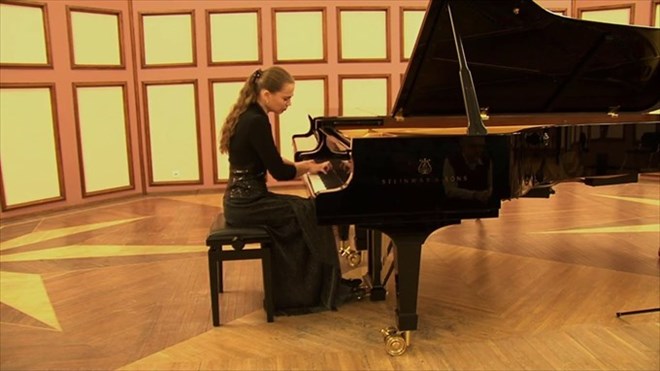
Pianist Anna Grot and violinist Polina Borisova from Russia will present a classical music performance as part of the framework of the annual programme Arts Ambassador in big cities on June 6-8.

Pianist Anna Grot (Photo courtesy of the Saint Petersburg House of
Music)
The event is being held by the Russian Centre for Science and Culture in Hanoi,
in collaboration with the Saint Petersburg House of Music, to mark the National
Day of Russia.
The concert will feature outstanding pieces created for violin and piano by
world famous composers including Nikolay Rimsky-Korsakov, Franz Liszt, Pyotr
Ilyich Tchaikovsky and Alexander Glazunov.
Due to their outstanding talents, the young artists have won prestigious awards
at numerous music competitions in both Russia and throughout the world.
Borisova was born in Ryazan, in 1988. When she was four, she started her music
education at children’s music school. In 2007, Polina finished the Chopin
Moscow State College of Music Performance. In 2012, she graduated from the
Tchaikovsky Moscow State Conservatory and in 2014 graduated from post-graduate
studies. Since 2015 she has worked as an assistant lecturer at the Moscow
Conservatory. She is laureate of various international competitions.
Grot was born in 1990 in the town of Chekhov in Moscow. She graduated from the
Central Music School at the Moscow Tchaikovsky Conservatory. She is a winner of
many international competitions. Honored Artist of Russia, Professor Andrei
Pisarev, remarked on her as a "brilliant virtuoso and artistic qualities, a
bright temperament, a developed and mature musician”.
Through the unique performances, the Arts Ambassador concert offers an
opportunity for Vietnamese music lovers to learn more about Russian classical
music, said N V Shafinskaya, director of the Russian Centre for
Science and Culture in Hanoi.
The event also contributes to strengthening the traditional friendship between
Vietnam and Russia as well as enhancing mutual understanding between the two
countries' people.
The concerts will take place on June 6 at the National Music Academy (Hanoi),
on June 7 at the Nguyen Hien Dinh Tuong (Classical Drama) Theatre (Da Nang) and
on June 8 at the HCM City Music Academy (HCM City). Entrance is free.
Source: VNA
Hoa Binh province has carried out multiple programmes and initiatives to revive its cultural heritage which has gradually fallen into oblivion through the ebbs and flows of history.
The most prominent and defining feature in the prehistoric era of Hoa Binh is the Hoa Binh Culture. The Culture was first discovered in Hoa Binh. The significant prehistoric culture represents not only Vietnam but also Southeast Asia and southern China. Through excavations of cave sites in the limestone regions of Hoa Binh, French archaeologist M. Colani introduced the world to a "Stone Age in Hoa Binh province – Northern Vietnam" in 1927. On January 30, 1932, the First Congress of Far Eastern Prehistorians, held in Hanoi, officially recognised the Hoa Binh Culture.
Known as the "Land of Epic History”, Hoa Binh province, the gateway to Vietnam’s northwest, boasts a strategic location and a unique cultural tapestry woven by its ethnic minority communities.
The People's Committee of Luong Son District recently held a ceremony to receive the certificate recognizing Sau Communal House in Thanh Cao Commune as a provincial-level historical and cultural site.
Recognising the importance of cultural heritage preservation in protecting and promoting the value system of Vietnamese culture, and serving socio-economic development in the new period, Party committees and local administrations in Hoa Binh province have identified it as a key task in the cultural development strategy. The province has been making efforts in mobilising resources, creating consensus among people and engaging ethnic communities in preserving and promoting cultural identity.
Hoa Binh province has captured growing attention both domestically and internationally for its distinctive cultural heritage and rich history. Most notably, it has been renowned for its famous Hoa Binh culture, considered the cradle of ancient Vietnamese civilisation. Looking ahead to significant milestones in 2025 and the 140th anniversary of province establishment in 2026, Hoa Binh Newspaper presents a comprehensive overview of the province's development across economic, social, cultural, tourism, and security domains.



